Codes of Desire | One Mountain Oral Essays | Dr. Marc Gafni
Codes of Desire: On the Nature of Reality: The Answer to Who, Where, and What
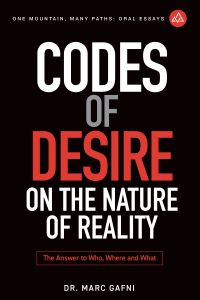
Reality is not empty or blind. Reality is animated by plot lines. These are the plot lines of evolution. The plot lines of evolution are Reality’s codes of desire. Reality’s desire is for Value. Eros is Value and Value is Eros. There is no split between them. It’s Eros Value. That is the plotline of the CosmoErotic universe.
We are part of and participatory in Reality. Thus, like all of reality the plotlines of our lives are mapped by our codes of desire. Our clarified desire participates in the larger Field of Desire, which is also the Field of Eros Value. Our capacity to clarify, deepen and evolve our unique codes of desire is the evolution of Reality itself. Our unique codes of desire are evolution becoming uniquely conscious through each of us.
With the dogmatic claim of our postmodern zeitgeist that Value and therefore Eros Value have collapsed, an unbearable emptiness wells up in our hearts. We are no longer able to access the self-evident validity of Eros Value. We feel deadened and devalued. This dynamic at the very heart of culture is direct cause for existential risk. For the collapse of Eros is direct cause for the collapse of ethos, the breakdown of value. We seek to cover up the emptiness of Eros’s collapse through pseudo-Eros. Pseudo-Eros exponentialized generate the tragedies of the commons that are the very heart of existential risk. To reclaim value and ethos, we must first reclaim Eros.
Published by World Philosophy and Religion Press in conjunction with Integral Wisdom Publishers.
Book details:
Title: Codes of Desire: On the Nature of Reality: The Answer to Who, Where, and WhatAuthor: Dr. Marc Gafni and Barbara Marx Hubbard
Series: Oral Essay Series – Volume 21
Publisher: World Philosophy and Religion Press in conjunction with Integral Wisdom Publishers.
ISBN-13: 979-8888340288
Formats: Paperback, e-book, audiobook.
Table of Contents
CHAPTER 1 THE HOMO AMOR PRACTICE OF WRITING YOUR OWN SONG OF SONGS—OUTRAGEOUS LOVE LETTERS
- Reality Is Codes of Desire
- The Sacred Is Value Exponentialized
- All the Great Traditions Understood: Reality Is Codes of Desire
- Song of Solomon
- Always Kissing
- Every Foot a Shrine
- God Desired Me, So I Came Close
- His Choir
- Like Passionate Lips
- I Have Come Into This World to See This
- The Sacred Means Ultimate Intimacy
- The Democratization of Flaming Great Love
- The Homo amor Practice of Writing Outrageous Love Letters
- Mary’s Mosaic
CHAPTER 2 REWRITING THE SCRIPT OF DESIRE: FOR WOMEN, FOR LIFE, FOR FREEDOM—MAHSA AMINI DID NOT DIE IN VAIN
- At This Precise Moment, Just Like Dystopia Hovers, So Does Utopia
- Creating the Future as Homo amor
- Evolutionary Love Code: Radical Aliveness Is Life
- Mahsa Amini Sacrificed Her Life for Eros
- There’s No Split Between Eros and Ethics
- Brothers, There’s Always a Path Home
- The New Story of Desire: Reality Is Eros
- The Four Sexual Narratives in Reality Today
- Eros Is Not Mere Sentiment; It Is the Heart of Existence Itself
- Two Ways to Murder Eros: The Morality Police and the Sex-Positive Liberal Response
- Pornography Is the Decontextualization of Radical Sexing From Radical Living
- A Pornographic Universe Violates the Goddess
- Fundamentalist Totalitarianism and Pornographic Totalitarianism
- The Only Response to Pornographic Totalitarianism Is Your Own Unique Desire
- The New Story of Value: The Full Power of Your Unique Desire
- Baraye: Protesting for the Sake of the All
CHAPTER 3 FROM HOMO SAPIENS TO HOMO AMOR: RECLAIMING THE AUTHORSHIP AND AUTHORITY OVER OUR CODES OF DE
- Reclaiming the Script of My Unique Desire From Totalitarianism
- All Desire Is Non-Local
- We Need to Recover a Memory of the Future
- Desire Reaches for the Future
- What Is Your Deepest Heart’s Desire?
- Reclaiming the Dignity of Need
CHAPTER 4 THE RESPONSE TO EXISTENTIAL AND CATASTROPHIC RISK IS THE DAWN OF DESIRE
- Evolutionary Love Code: The Dawn of Desire
- Four Responses to Existential and Catastrophic Risk
- 1. The Doomer Response
- 2. The Denial Response
- 3. The Domination Response
- 4. The Desire Response
- The Fourth Response to the Meta-Crisis: the Dawn of Desire
- Seeing the Storyline: From Unconscious to Conscious Evolution
- Need and Desire Are Isomorphic at Fundamental and Aspirational Levels of Evolution
- I Am a Unique Feature of the Field of Desire
- Clarified Desire Equals Value, and My Clarified Desire Is Unique
- The Dignity of Desire
- Clarifying Our Desire in Response to the Meta-Crisis
- Desire Is Prayer, Prayer Is Desire
- Reality Is the Desire for Ever More ErosValue
CHAPTER 5 THE DEGRADATION OF DESIRE—DISCERNING ISRAEL & HAMAS CONFLICT: EVOLVING THE BATTLE OF GOOD & EVIL TO A HIGHER LEVEL OF CONSCIOUSNESS
- How Do You Begin a Conversation? [October 8th 2023]
- Eros and Ethics Are the Same Thing
- In the Field of ErosValue
- Every Religion Must Evolve
- This Is Not a Story of Moral Equivalence
- The Deconstruction of Value Arouses Hamas
- At the Core of the Hamas Narrative Is a Degradation of Desire
- We Need to Articulate a New Ground of Desire
- Purity of Desire
- Shocks of Existence Press Us Into Gnosis and New Emergence
- A New Culture of Eros: The Democratization of Hieros Gamos
- The Battle Between Good and Evil Exists in Every Human Being
- Pseudo-Eros Exponentialized Becomes the Ring of Sauron
- Greater Is the Light That Comes From the Darkness
CHAPTER 6 BARBIE, HAMAS, AND HOMO AMOR—FROM DEGRADED LOVE STORIES TO THE UNIVERSE: A LOVE STORY
- Responding to the Culture of Death as Homo amor
- The Refusal to Make Distinctions Contravenes the Interior of Homo amor
- False Stories Confuse Us
- A Failed Love Story on a Collective Level Results in Horror
- Let’s Get Out of Superficial Distortions
- Evolutionary Love Code: Homo amor, the Alternative to Postmodern Materialism or Pseudo-Erotic Violent Fundamentalism
- Universe Story 1—Barbie: “There Is No Love Story”
- Clarified Desire Discloses Value; Eros Is a Value of Cosmos
- If There Is No Eros, There Is Pseudo-Eros
- Universe Story 2—Hamas: The Demonization of Desire
- Postmodernism and Fundamentalism Are Both Failed Love Stories
- Universe Story 3: The Realization That the Universe Is a Love Story
- The Universe: A Love Story
- The Moral Imperative of the Universe: A Love Story
CHAPTER 7 EROS AND GNOSIS AND ETHICS ARE ONE: REALITY IS EVOLVING CODES OF DESIRE
- The Breakdown of Sensemaking
- The Future of Reality Depends on Our Capacity to Articulate a Shared Story of Value
- Evolutionary Love Code: The Sensuality of Sensemaking
- What We Think Is Less Than What We Know
- Global Resonance Requires a Common Sense
- The Shared Story of Reality Is the Story of Reality’s Sensuality
- Eros Is a Dynamic Creative Movement of Reality
- Two Codes of Desire: Code of Reality and Sacred Texts
- Reality Is ErosValue
- How Do You Know Value Is Erotic? Because Value Arouses Our Will
- The Experience of Value Lives Within the Experience of Eros
- In the Ecstasies of Desire, the Split Between Autonomy and Communion Disappears
- Reality Is Desire: The Name of God
- The Field of Desire Lives in Me
- ErosValue Is the Loveintelligence and LoveBeauty and LoveDesire of Reality
- My Unique Name of God Emerges From My Unique Configuration of Desire
- Evolutionary Love Code: Eros and Gnosis Are Not Separate
- To Be What We Are, We Need to Love Madly
- Even as We Are All Unique, We Are All the Same
CHAPTER 8 COSMOEROTIC HUMANISM—TRANSITIONAL OBJECTS, EVOLVING CODES OF DESIRE, AND THE NEW HUMAN AND THE NEW HUMANITY
- To Heal Reality, We Must Heal Our Narratives of Desire
- How Do I Clarify My Own Code of Desire?
- Homo Armor to Homo amor
- Who I Am Is Desire, and Desire Is the Plotline of My Life
- My Desire Is Sacred
- The Beginning of Healing Broken Codes of Desire Is Honoring Desire
- To Be in Joy Is a Direct Byproduct of Accessing the Unique Quality of My Desire
- I Am Part of the Throbbing Field of Eros, Which Desires Ever Deeper Shared Identities
- The Plotline of My Life Is My Unique Code of Desire
- The Mother Is the Universe: A Love Story in Person
- When I No Longer Feel the Body Then I Create False Certainties Which Overwhelm Me
- When My Desire Is Shamed, I Can’t Access the Goodness and Aliveness of Reality and I Reach for a Transitional Object
- I Need to Re-Access Desire as It Lives in My Body
- Reclaiming the Lost Code of the Body Sacred: The Song of Solomon Is Holy of Holies
- The Text of Ethos Is Written in the Body Sacred
- When I Access My Unique Code of Desire, I Transcend the Pornographic Universe
- When We Split Off the Other, We Violate the Desire of Culture
- This Field of Desire Is the Place Where I Know That I Am Welcome in the Universe
- Desire in Its Dignity Allowed the Lineage of Solomon to Survive the Exile
- This Narrative of Desire Must Articulate a New Story of Value
CHAPTER 9 CLARIFIED FIRST VALUES AND FIRST PRINCIPLES GENERATE RIGHTS AND RESPONSIBILITIES
- Evolutionary Love Code: Clarified First Principles and First Values Generate Rights and Responsibilities
- Clarified Desire Is Precisely the Same as Need
- The Name of God Is Desire Reaching for the Future
- Clarified Desire and Need Are Completely Isomorphic
- My Clarified Need Is Always for Value
- We Need to Ground Rights in First Principles and First Values
- Bilateral Rights to Desire—and Their Responsibilities
- Formulating Rights and Grounding Them in a Field of Value
- Desire and Need Activate the Eye of Value
- Human Interiors Participate in the Interior Face of Cosmos.
- Intimacy, Desire, and Attention: Rights and Responsibilities
- Rights and Values Are Both Eternal and Evolving, and We Clarify Them by Clarifying Our Own Interiors
CHAPTER 10 FROM VALUES TO RIGHTS
- The Most Momentous Leap in the Evolution of Human Consciousness: Universal Human Rights
- If We Cannot Understand Where Rights Come From, We Will Lose Them
- Rights Come From Clarified Need and Desire
- Value Creates Rights
- Every Right Is Also a Responsibility
- The Field of Value Is Universal
- Activating the Eye of Value to Articulate First Principles and First Values
- How Do We Enact Rights?
CHAPTER 11 IMPLICATIONS FOR SOCIAL STRUCTURE: IN DIALOGUE WITH DR. ZACHARY STEIN
- The Right to Desire and the Right to Be Desired
- A Need Generates a Right, a Desire Generates a Responsibility
- The Need of Cosmos Which Is Directly Related to Value and Not Reducible to the Biological
About the Author:
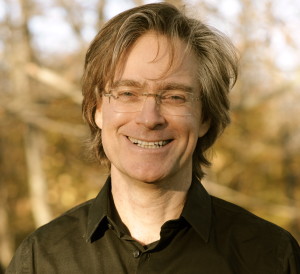 Dr. Marc Gafni is a leading public intellectual and teacher impacting the source code of global culture.
Dr. Marc Gafni is a leading public intellectual and teacher impacting the source code of global culture.
Gafni is a visionary thinker, social activist and passionate philosopher. He is known for his “source code teachings”, including Unique Self theory and the Five Selves, the Amorous Cosmos, A Politics of Evolutionary Love, A Return to Eros and Digital Intimacy.
He is author of twenty five books, of which the first ten have been published, including the award-winning Your Unique Self: The Radical Path to Personal Enlightenment.
He holds his doctorate in philosophy from Oxford University, as well as Orthodox rabbinic ordination.
He teaches on the cutting edge of philosophy in the West, helping to evolve a new ‘dharma’ or meta-theory of Integral meaning that is helping to re-shape key pivoting points in global consciousness and culture, with the aim of participating in the articulation of what Dr. Gafni together with Dr. Zak Stein and colleagues are calling CosmoErotic Humanism.
At the core of CosmoErotic Humanism is what Dr. Gafni and Dr. Stein are calling ‘First Principles and First Values’, Anthro-Ontology and a “Universal Grammar of Value”.
This is the ground of a new shared universe story and a new narrative of identity for the new human and the new humanity. This is what they are calling the emergence from Homo sapiens to Homo Amor.
This shared story rooted in First Principles and First Values can then serve as the matrix for a global ethos for a global civilization.
Gafni is considered by many to be a kind of Einstein of Philosophy who is leading a team of thinkers articulating a new vision of meaning for the world.
Dr. Gafni is the Co-Founder together with Ken Wilber and Sally Kempton of the Center for World Philosophy and Religion where he serves as its co-president. Together with Dr. Zak Stein, they are co-leading a team of thinkers, articulating a new vision of meaning for the world.
In 2014 Dr. Gafni co-initiated the Success 3.0 Summit and Rise Up movie, whose method and movement is to bring together key thought leaders and change-agents to collaboratively evolve a bold new Integral vision of Success, rooted in the entrepreneurial values of Wake Up, Grow Up, Show Up, and Outrageous Love.
Over the past 30 years, Dr. Gafni has developed evolutionary and activist programs rooted in his commitment to what he has termed “participating in the evolution of love.” Together with author and social innovator Barbara Marx Hubbard, he is working on a series of new works revolving around Evolutionary Spirituality.
Explore more:
Explore the Great Library:
Center for World Philosophy & Religion – Oral Essay Series → https://worldphilosophyandreligion.org/books/
Learn about the full Oral Essays series:
Complete Oral Essay Series → https://worldphilosophyandreligion.org/oral-essays-series-one-mountain-marc-gafni/
Dr. Marc Gafni Official Website:
https://marcgafni.com/
Center for World Philosophy and Religion:
https://worldphilosophyandreligion.org/
Free Weekly Broadcast with Dr. Marc Gafni:
https://www.onemountainmanypaths.org/
Join the community Who We Must Become:
https://who-we-must-become-3166d4.circle.so/
Free Unique Self Mini Course:
https://www.uniqueselfinstitute.com/the-unique-self-mini-course/
Formal refutations on controversy:
WhoIsMarcGafni.com
Social Media Dr. Marc Gafni:
Substack: https://substack.com/@marcgafni
Instagram: https://www.instagram.com/marcgafni/
YouTube: https://www.youtube.com/c/MarcGafni
Facebook: https://www.facebook.com/DrMarcGafni
Twitter:https://twitter.com/MarcGafni
LinkedIn: https://www.linkedin.com/in/drmarcgafni/
TikTok: https://www.tiktok.com/@drmarcgafni

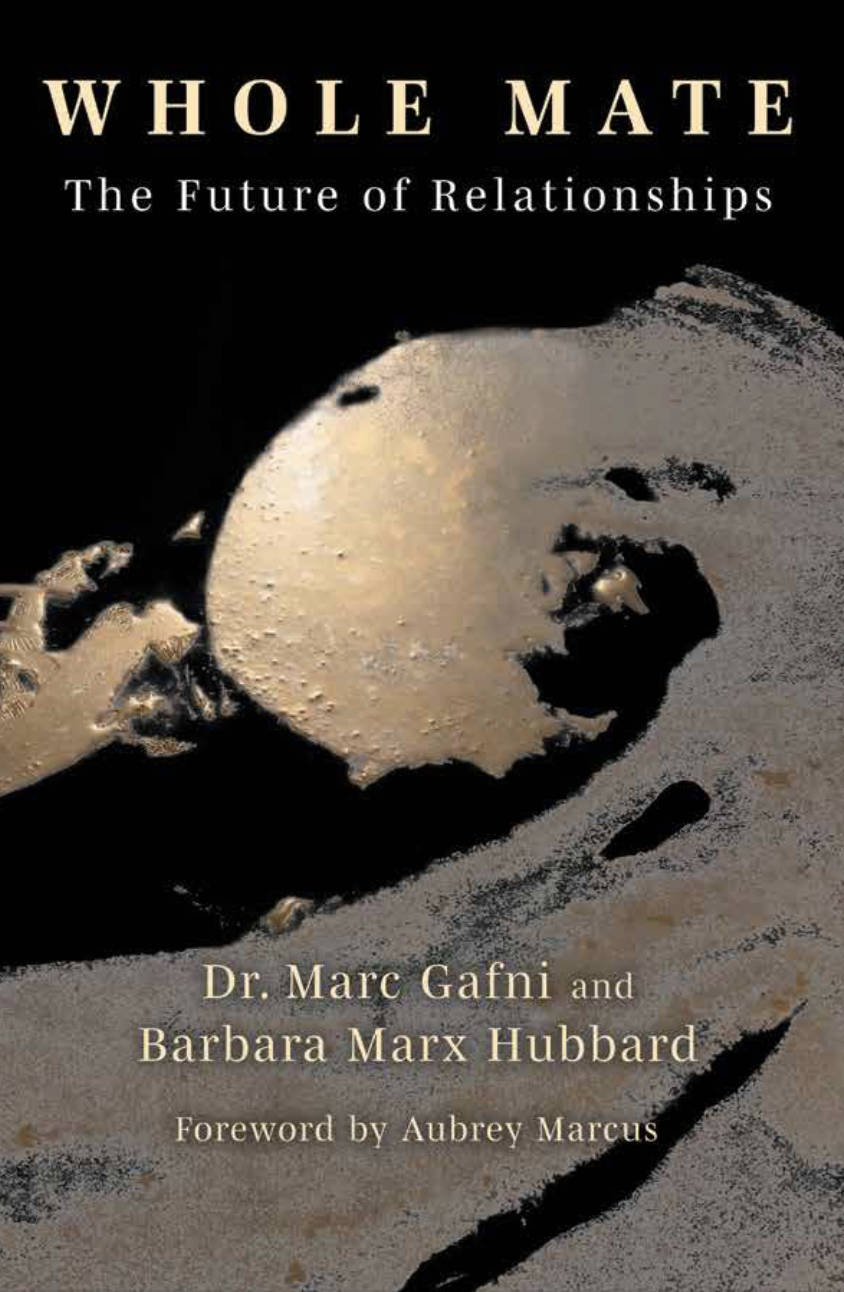
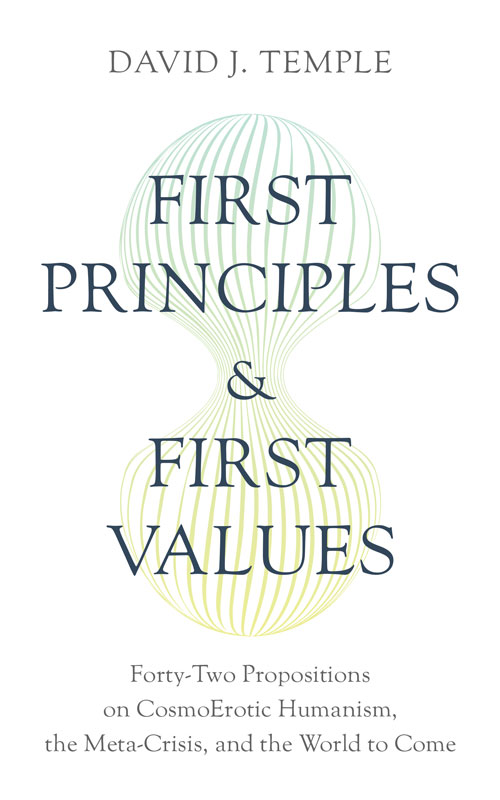
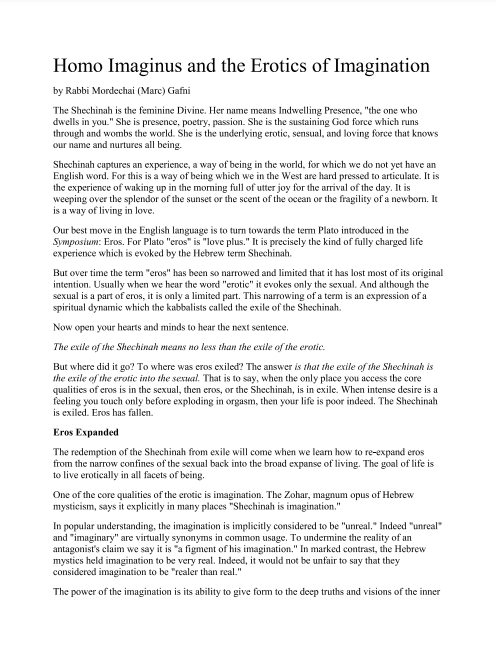
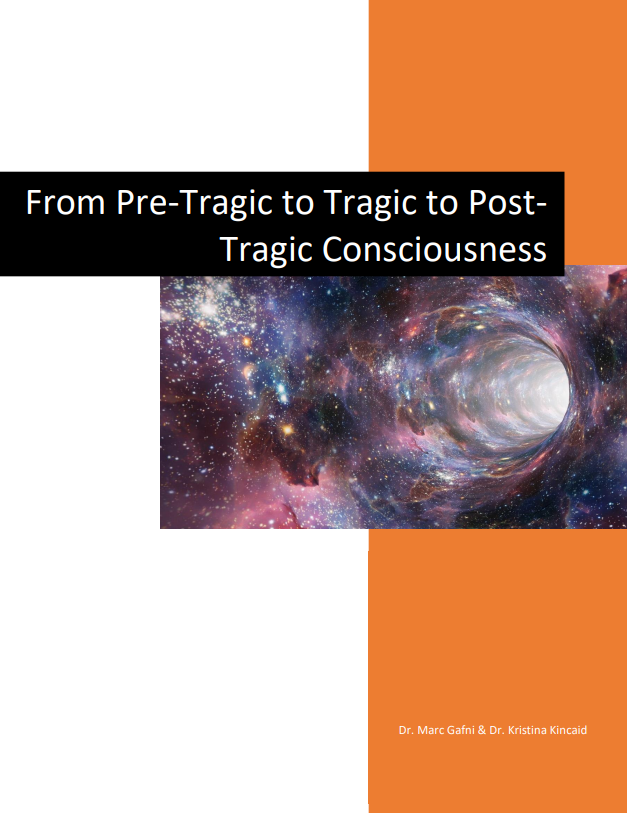
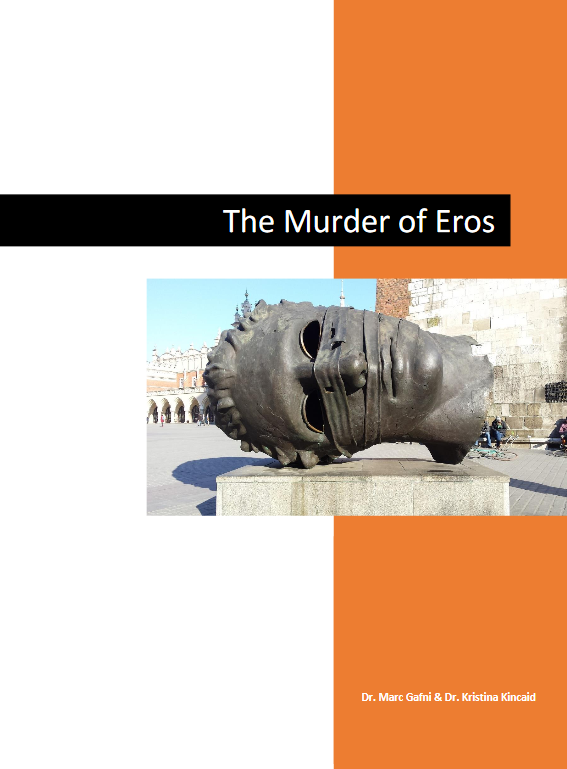
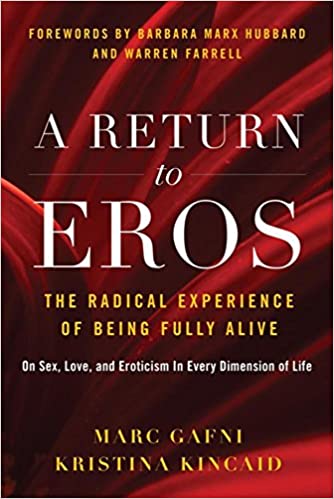
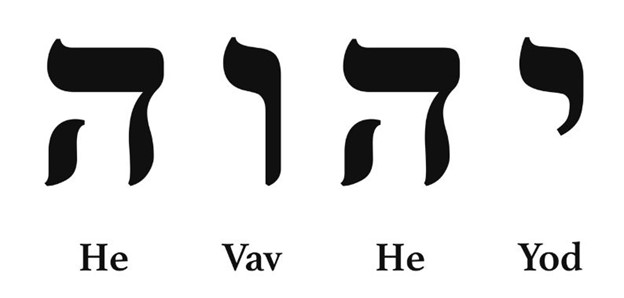
 By
By 